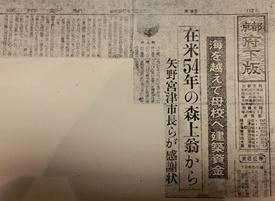Morikami Sukeji, who came to America as a member of the Yamato Colony in South Florida and remained there alone until the end of his life after the colony was dissolved, continues to write letters to his sister-in-law and her family, who lost her husband (Sukeji's younger brother) after the war. Over the years of correspondence, they come to feel like they are a real family, and even talk about living together. However, there are many obstacles.
* * * * *
September 14, 1952
Beauty
It's been a long time since I last wrote. I'm sorry, but I've been busy and tired, so I've been putting it off day by day. There have been two typhoons since the beginning of this month. The first one hit with a wind speed of 110 miles per hour, and the second one with a wind speed of 150 miles per hour, but they didn't come close and went north, so there was no damage.
For the past week or so, it has been raining almost every day, and it has been very humid and unpleasant. At night, there are so many mosquitoes that I can't go outside naked.
Singer sewing machines are a well-known name, so they are very expensive in this country. The lady at the florist next door also uses a portable Singer. It's very small and weighs very little. It's portable, so it's convenient to use when traveling. She says it costs about $125. Recently, they've been repairing old Singers and selling them for about $25 with a five-year warranty. They're so good that you can't tell them apart from new ones. I'm sure a lot of them are exported to Japan. A lot of Japanese-made ones are also coming in. They're quite popular because they're good quality and reasonably priced, but high-quality ones cost around $150.
I think a Japanese-made portable would be good for Reiko, so please choose one between you. I will send the money to you shortly.
"I could call you, but..."

As you know, I own a lot of land, but I don't have any money. In addition, I had some debts, so I sold part of the land, even though it was cheap, to repay the debt.
If the remaining 280 acres were sold in the normal way, it would be worth $60,000 to $70,000, but unlike goods, land does not have a fixed price, and negotiations are difficult, so the transaction takes time.
The three years of our promise are running out. I will be 67 in November. I want to return to Japan soon and spend the rest of my life with you. I want to build a modest home in the suburbs of Kyoto or near Miyazu Bay and do my favorite things, like growing vegetables and taking care of flowers. I want to live a new life, farming in the sun and reading in the rain. I don't think it's impossible for you to go to America, but even if you can, you'll have to think about it a lot.
If you live in the West and there are many Japanese people, it's not a big deal if you can't speak the language, but in a place like here where there are almost no Japanese people, it's not that difficult or pitiful to not be able to speak the language. Yamauchi-kun's wife is a good example. Even though she has been in America for decades, the only person she can talk to is her husband. No matter how materially blessed she is, she can feel lonely and get homesick without even realizing it.
You are still young. Forty-five or forty-six is the prime of a woman's life, and I am sacrificing you because I am incompetent. This is the most unbearable thing I can do. I am in pain, and there is no other way out. This is just my opinion. Please tell me yours too. It will be for both of us.
The seedless water melon turned out well. It looked good and tasted good. The only drawback was that it had gaps when ripe. The seeds were small and white and soft, but the combination with the bright red flesh was not good. I tried a few other new varieties, but the results were not good.
My appetite has improved recently and everything I eat tastes good. I think I'll gain weight by four or five pounds in the near future. I've grown a lot of sweet potatoes. If I'm close, I'd like to send them to you. I'd like to try making a Japanese variety, so I'll send you the details in the next post. I'll send you the money soon. Bye.
January 1, 1953
<Sandstorms also strike>
Beauty
Sorry for the late reply. I really want to send you some money, but I don't have it. I have to pay last year's tax in one month.
The crops we had worked so hard to grow were wiped out by the successive cold waves and strong winds. We worked day and night to replant them, and just when we thought they had finally grown, a sandstorm struck and caused great damage. Fortunately, the pepper seedlings were saved and we are currently planting them, but the weather is bad, we don't have enough manpower, and we have to pay exorbitant wages, so it's tough.
Yesterday was Sunday, but I worked until late into the evening and was tired, so I took a short rest, lay down on the bed with my shoes on, and fell asleep.
It's just after 1am and the cold north wind is blowing. It's quite cold, at 51 degrees (about 11 degrees Celsius), and the flu is also prevalent in this area. The florist next door has also been closed for two weeks due to the flu. However, I'm fine, so please don't worry.
January 1, 1953
<We will get you citizenship and have you come>
Beauty
The weather is bad and unsettled as usual, and the crops are not growing as expected. I wish March would come soon... Farmers are waiting for the warm spring weather, regardless of the weather. Today, the weather is good and the temperature is quite high, but it is a little cold.
It's just after 9am and the indoor temperature is 70 degrees (21 degrees Celsius). I had a cough last night and couldn't sleep well, so I decided to take the day off.
I still can't get money. Unlike in Japan, it's impossible to get a loan from a bank using the land as collateral. As a last resort, I can borrow money using the farm tools as collateral, but this is not a good idea. What worries me is that even if I can get money temporarily, it will do more harm than good.
The wives of GIs (non-commissioned officers of the occupying forces, referring to American soldiers) are moving to the United States in droves, and their compatriots, the first generation, are busy trying to obtain citizenship.
I had once decided to return to my home country, but if the land does not sell as expected, I will have to change my mind. The only thing I can do is to obtain citizenship and have you come here. I don't think this is impossible.
A land agent from town came and said he wanted to buy a piece of my land. There is a big gap between the price I'm asking and the price, so I don't think we can come to an agreement right away. I think we can come to a compromise and come to a fair price. Land transactions are a hasty endeavor.
March 31, 1953
"The moon is bright and it's like daytime outside."
(To his nephew, Osamu Okamoto)
Thank you for the other day, Shu-san. Thanks to you, his wound is healing extremely well. His appetite is improving day by day. I don't think he'll die anytime soon.
Congratulations on graduating from school. You are about to embark on your journey into the real world. From now on, even if things don't go as you expected, please don't be pessimistic or push yourself too hard. Things in this world never go as you would hope. I also suffered a lot when I was young. I pushed myself too hard without realizing it.
During the day, it's 80 degrees Fahrenheit (27 degrees Celsius), and at night it's around 60 degrees (16 degrees Celsius). Because there's a gentle breeze and the air is dry, it's not too uncomfortable even when the temperature rises to over 90 degrees (32 degrees Celsius) in the summer. I'm completely naked (only to the waist).
I work in the fields all day, and there's nothing unusual or interesting happening. I haven't seen any Japanese people in almost a year. When I was sick, the neighbors were kind to me. When I had almost no appetite while I was sick, my friend's wife went out of her way to bake my favorite pumpkin pie and bring it over to me.
When I feel good, I go to the fields and work in the soil. Reading newspapers and magazines is my greatest comfort. Nothing brings back more nostalgia than an article about my homeland. The moon is bright tonight and it feels like day outside. Please take good care of your health. Good night.
P.S. Because the fields were used as an airplane path (north-south), it was quite noisy during the day, but it was extremely quiet at night. During the war, airplanes flew all day and night.
(Titles omitted, * indicates notes by the author)
© 2019 Ryusuke Kawai






